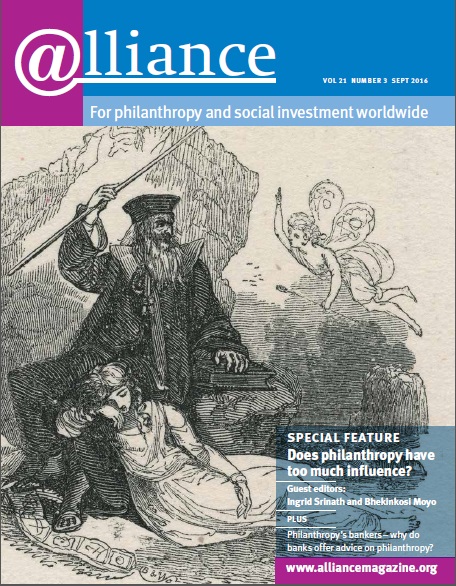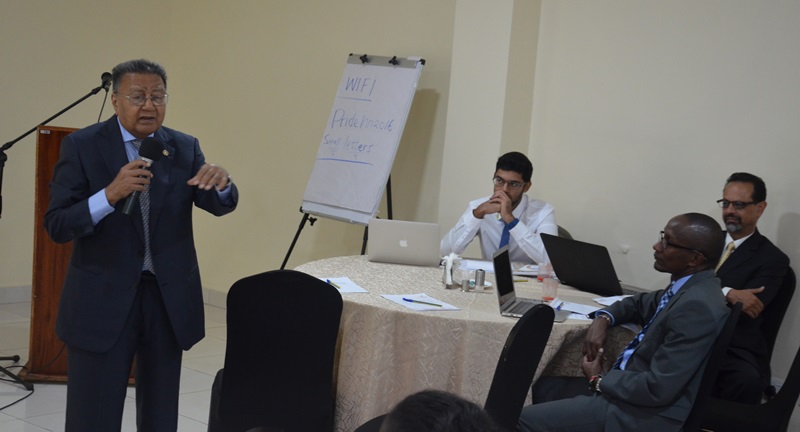Alliance put the following questions to a panel of experts around the world of philanthropy:
- How involved should philanthropy be in determining public policy and/or influencing the public sphere?
- Does it depend on how the philanthropist or foundation goes about it?
- Can you give an example of where philanthropy has played an ideal role or, conversely, where it has overstepped its power?
- Would you like to see philanthropy having more or less influence on public policy in your country/region?
Comment by John Harvey
Foundations should certainly work to influence public policy when it directly affects the sector’s status and well-being. In the US, this means issues like payout, charitable deductibility, regulations governing cross-border grantmaking, and more.
One recent example of this sort of foundation involvement stands out for me. As Alliance has covered, global philanthropic engagement is imperilled by the closing space for civil society, but one bright spot has been the willingness of the Financial Action Task Force (FATF) to address its own role in disabling civil society. Foundations like Open Society and Oak have been important partners in global collaborative efforts to addresses this challenge, quite recently with some very positive results.
‘Outside that limited space, foundations should steer absolutely clear of trying to influence public policy. That is simply not a proper role for any elite, undemocratic and/or inadequately accountable institution – and, unfortunately, most foundations fall within this category.’
Outside that limited space, foundations should steer absolutely clear of trying to influence public policy. That is simply not a proper role for any elite, undemocratic and/or inadequately accountable institution – and, unfortunately, most foundations fall within this category.
The role of foundations is, rather, to fund the public policy work of civil society organizations (CSOs) – but not just any CSO engaged in public policy. Such work needs to possess at least one of the following qualities:
- It should enjoy significant public support. Elite wealth getting behind very narrow or selfish interests is not helpful for society at large.
- It should promote internationally agreed norms and standards. Equal rights for women in Iran may not enjoy broad public support, but such rights are enshrined in the Universal Declaration of Human Rights, to which Iran is a signatory. Any CSO working on such issues, even if locally unpopular, is a legitimate recipient of foundation funding.
- It should promote government accountability. If a law has been passed but is not being properly implemented, CSOs working to hold governments accountable are legitimate recipients of foundation support.
Unless at least one of these criteria is met, I do not believe that foundations have a right to engage in public policy. And where they do legitimately do so, it is key that they should not drive the agenda, their proper role being as financial supporter, convener and thought partner.
The Civil Marriage Collaborative is an excellent example of foundations strategically supporting the public policy work of CSOs. Over the course of 11 years, a group of US foundations, including Ford, Gill and Overbrook, funded efforts to change hearts and minds – and ultimately the law – to bring about gay marriage in the US. Indeed, the role of philanthropy in bringing about this remarkable win for human rights cannot be understated.
John Harvey is an independent philanthropy professional and director of Global Philanthropy Services LLC. Email johnharveyinafrica@gmail.com
Comment by Atallah Kuttab
The Arab region has suffered from the lack of a vibrant philanthropy sector that can effect sustainable positive change. Except for the years 2011-12, philanthropy organizations have shied away from offending government and have stuck to provision of services, avoiding projects that address the deep structural reasons for government’s failure to deliver.
The key question is: should the philanthropy sector be part of society and responsive to its needs as part of its accountability to society? Or should it be accountable primarily to government with no consideration of societal needs? If the answer is the former, then it should be involved in influencing public policy for a more equitable society directly or indirectly by helping CSOs.
‘Unfortunately, civil society in the Arab region in general is coming under tighter scrutiny. The few philanthropy organizations trying to deal with social justice and human rights issues are facing government hostility and punitive regulation.’
Unfortunately, civil society in the Arab region in general is coming under tighter scrutiny. The few philanthropy organizations trying to deal with social justice and human rights issues are facing government hostility and punitive regulation. Most private wealth goes into supporting projects or single outputs; rarely does it support the demand for systemic change and more equitable societies. More needs to be done to instil an awareness of the need for philanthropy to support CSOs to this end, and to give them the courage to do so.
Though they are few, there are examples that emphasize that the aim of government should be the welfare of society and that the philanthropy sector has a positive role to play in making this possible. The passing of two laws in the Kingdom of Saudi Arabia on protection of children and the rights of divorced women would not have been possible without the active lobbying and involvement of the philanthropy sector and civil society. The approach there was to look for incremental change rather than being confrontational with government, and it worked. Similarly, the protection of citizens’ rights in Palestine would not have been achieved without the engagement of the philanthropy sector and civil society in shaping relevant public policies, including holding the police accountable for abuses and exposing inefficiencies and corruption within government.
Atallah Kuttab is founder and CEO of SAANED for Philanthropy Advisory in the Arab Region. Email akuttab@saaned.com
Comment by Janet Mawiyoo
In theory it would be good for philanthropy to be involved in influencing public policy, but the reality is that only progressive philanthropy really gets into this area of work.
Our philanthropic efforts at the Kenya Community Development Foundation, for example, are often more focused on visible projects such as building health clinics and schools or giving scholarships to improve educational opportunities.
Influencing policy to improve the environment for local giving – for example, by encouraging the government to provide effective tax breaks – could result in more people giving more, and therefore more funds being raised to support needy communities. Philanthropic involvement to influence public policy is thus a critical way of achieving greater gains for a greater public good.
‘Influencing policy to improve the environment for local giving – for example, by encouraging the government to provide effective tax breaks – could result in more people giving more, and therefore more funds being raised to support needy communities.’
How successful the foundation or philanthropist is in influencing policy is in turn affected by how flexible they are, and how much they understand what policy needs to be influenced and what needs to be done. Patience is useful: results are not always achieved overnight. This is not a straightforward process.
Here in Kenya we have a few philanthropists who are highly respected by the government – credible individuals who are seen to commit serious resources to the country’s various needs. One such individual is Dr Manu Chandaria, who has often joined representatives of CSOs when they need to make presentations to the parliamentary committee or the Ministry of Devolution, for example on changes that CSOs have been proposing to the Public Benefits Organizations Act – an Act designed to reorganize the sector, and get it to operate under one law.
On several occasions, Dr Manu has joined us in person; he has also been a spokesperson for other local foundations, collecting views from them and requesting one-to-one meetings with the relevant Cabinet Secretary to help them understand the issues that are hurting CSOs in the country and encourage dialogue. This seems to me a positive way of using your philanthropic position and influence to improve policy.
Janet Mawiyoo is chief executive officer, Kenya Community Development Foundation. Email Janet.mawiyoo@kcdf.or.ke
Comment by Chandrika Sahai
Philanthropy’s influence can do good but it can also do harm, depending on whose interests are represented. I think philanthropy is most effective in supporting positive and long-lasting social change when it takes its cue from the communities it seeks to serve.
Its role in determining public policy or influencing the public sphere is positive only if it is guided by those who have been systemically marginalized, and if it upholds the rights and dignity of all.
For example, the Brazil Human Rights Fund (BHRF) funded a group called ‘Mothers of May’ which was formed in the aftermath of extreme police retaliation to gang violence in São Paulo in 2006. The victims were often poor young people of African or indigenous descent, many of whom died at the hands of the police. Most of them were not involved in organized crime and their families were unable to find out what had happened to them. Mothers of May – the mothers, families and friends of the victims – was formed to seek truth and justice for these victims.
Despite the risks involved in supporting an unstructured group and the fact that opposition to the police was involved, the BHRF supported Mothers of May in the belief that, since the group was closer to the problem, they would know best how to address it. Their support enabled Mothers of May to embrace the bigger struggle against police violence and the violence of militias. They went on to present a bill to the Brazilian legislature to ban the terms ‘death while resisting arrest’ and ‘resistance followed by death’ from police reports. This became law in the state of São Paulo in January 2013. A bill is currently before Congress to expand it into federal law.
‘In India, philanthropy is still more focused on service delivery and addressing the immediate symptoms of poverty and inequity. As the space for activism (in particular, any form of dissent) is closing down, I’d like to see philanthropy being bolder and playing a bigger role in supporting voices that challenge the status quo.’
In India, philanthropy is still more focused on service delivery and addressing the immediate symptoms of poverty and inequity. As the space for activism (in particular, any form of dissent) is closing down, I’d like to see philanthropy being bolder and playing a bigger role in supporting voices that challenge the status quo. This is the kind of influencing of the public sphere that philanthropy is well placed to exert.
Chandrika Sahai is the coordinator of the Working Group on Philanthropy for Social Justice and Peace. Email chandrikasahai@gmail.com
Comment by Boris Strečanský
How involved should philanthropy be in determining public policy? When foundations do not advocate for a particular policy, they stay on the fringes of the political arena. Although maintaining a more neutral position may enable them to exert influence as brokers or conveners, in other situations it may make sense for foundations to intervene directly or offer support to key actors who are advancing solutions alongside those who are affected by these policies.
The extent to which philanthropy should seek to shape policy also depends on the nature of the problem. Public policies are, after all, an attempt to answer the question of how the common good can be achieved. With many competing answers to this question, a foundation that presents its answer enters the public debate. Given that there is no consensus about the right policy for many societal problems, foundations would be well advised to invest in research before espousing a particular policy. Last but not least, it is the underlying value framework that the foundation either explicitly manifests or implicitly uses in its selection of goals and means that influences its policy orientation.
‘This debate is complicated because in democratic countries the views of citizens must be given a voice and space in the formulation of problems and policies that directly affect them – especially where there is a tradition of the interests of governments and ruling elites being elevated over those of the governed.’
This debate is complicated because in democratic countries the views of citizens must be given a voice and space in the formulation of problems and policies that directly affect them – especially where there is a tradition of the interests of governments and ruling elites being elevated over those of the governed. However, a more participatory approach does not in itself guarantee effective solutions.
There is much sense in foundations addressing the symptoms of problems and not always trying to fix the causes of often highly complex problems. Grassroots CSOs and those affected are in many circumstances better placed to fix these causes (with some modest help) than the often highly professional foundations.
Influencing the public sphere is also different from influencing public policy. The quality of the public sphere contributes to the quality of public policies: if the quality of the public sphere is poor (limited public discussion, core actors and agencies missing from the conversation), the policymaking process suffers too. In such circumstances, it makes sense for foundations to focus on improving the quality of the public sphere rather than advocating for any particular policy.
Philanthropy is at its best when it is twinned with social movements – for example, in the support it gave to the grassroots environmental movement in Central and Eastern Europe after 1989 or the policy changes it helped bring about in relation to domestic violence, led by various local women’s movements. Similarly, in circumstances such as today’s Ukraine, philanthropy should nurture the civic social movement born out of the Euromaidan revolution and help promote advocacy and policy work towards the reforms that the country desperately needs.
Boris Strečanský is an expert on philanthropy at the Center for Philanthropy, Slovakia. Email strecansky@changenet.sk
Comment by Andrés Thompson
The dictionary defines philanthropy as ‘love of humankind’, but philanthropy in practice is the set of institutions and people giving their time and money (and sometimes their lives) for the common good. That means not for profit but for the sake of humanity.
‘The business sector seeks to influence politicians in support of business agendas, so why shouldn’t civil society, with the support of philanthropic dollars, also seek to exert its influence?’
As such, philanthropic institutions seek to solve social, human and environmental problems. If their approaches prove to be successful, they try to find ways to make these solutions sustainable and to expand them. Traditionally, governments have been seen as the primary ally because of their capacity to bring small solutions to the core of public policies. So, private philanthropy should definitely seek to influence the public sphere. The business sector seeks to influence politicians in support of business agendas, so why shouldn’t civil society, with the support of philanthropic dollars, also seek to exert its influence?
The extensive legislation in Latin America on philanthropy and voluntarism is just one case in which local and international philanthropy have worked to influence public policy. For more than a decade the W K Kellogg Foundation supported the efforts of local organizations in Argentina, Brazil and Peru to improve the legislation regulating non-profit activities. As a result, important changes were made in those countries, in particular in relation to providing an enabling environment for collaboration between the non-profit sector and the government. As an illustration, the status of ‘civil society organization of public interest’, incorporated in Brazilian law, allowed for increased funding from government to CSOs.
In the field of human rights, Argentina’s exemplary prosecution of the military responsible for repression during the years of the dictatorship (1973–6) was the result of the constant pressure of human rights organizations, supported by local and foreign philanthropies. The laws passed in Argentina and Uruguay improving the recognition of sexual and reproductive rights – including the partial legalization of abortion – are also good examples of the influence of human rights organizations on government. This change in legislation was brought about, in large part, by the tireless advocacy work of several women’s rights organizations, supported by foundations.
It is worth noting that international funding influenced these achievements much more than local funding. That raises a question about sovereignty: to what extent should international foundations influence public policy in foreign countries?
Andrés Thompson is executive coordinator, Brazilian Network of Social Justice Philanthropy. Email andres.thompson5@gmail.com















Comments (0)